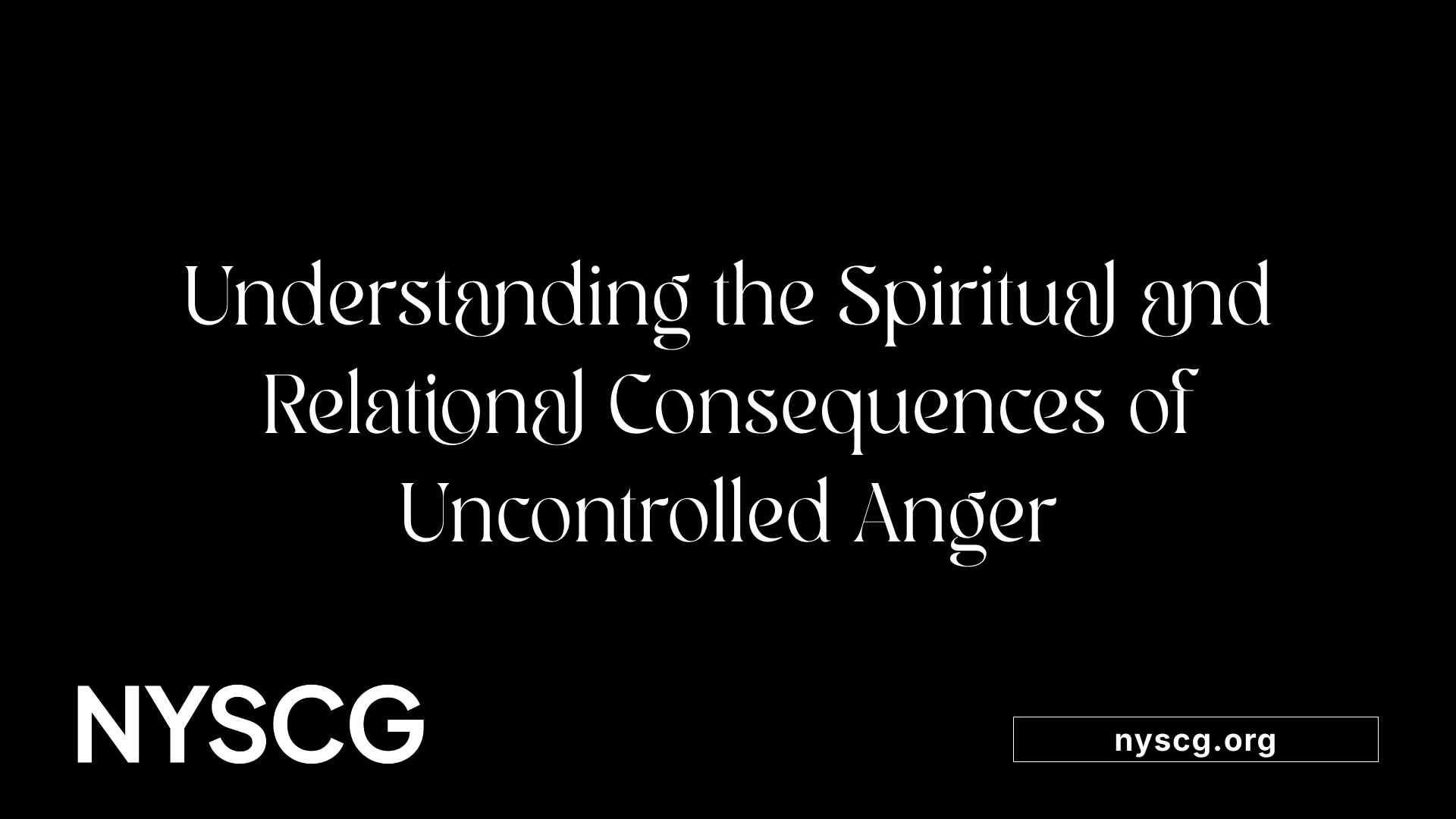How to Minister to Those Who Are Angry at Their Circumstances


Anger is a complex emotion deeply woven into the human experience, and within the biblical framework, it is neither inherently sinful nor always righteous. Recognizing the biblical principles surrounding anger equips ministers, leaders, and believers to respond compassionately and wisely. This article explores how to biblically address anger in its various forms—both justified and sinful—and provides practical guidance for ministering to those who are angry at their circumstances.

The Bible recognizes anger as a natural human emotion, but it also warns about the dangers of allowing it to go unchecked. Uncontrolled or sinful anger can lead to serious spiritual and relational consequences.
When anger is not managed biblically, it may result in harmful speech, broken relationships, and personal bitterness. These outcomes hinder one’s walk with God and can damage others around us.
Ephesians 4:26-27 explicitly advises believers to be angry but not sin, emphasizing that we should not let the sun go down on our anger. This guidance highlights that lingering anger opens the door for Satan to influence our hearts and actions.
Scripture makes it clear that unresolved anger can breed resentment and bitterness, which may ultimately lead to spiritual decline. It hampers our ability to forgive others and reflect Christ’s love.
The biblical approach advocates for managing anger through prayer, patience, and forgiveness to prevent these destructive effects. Regular self-examination and reliance on the Holy Spirit help believers handle anger biblically, maintaining peace with God and neighbor.
Aspect of AngerBiblical TeachingConsequenceHow to ManageNature of angerRecognized as normalPotential for sin if uncontrolledPray, forgive, seek self-controlSinful vs. righteous angerUnjustified anger leads to sinSpiritual harm, broken relationshipsCultivate patience, justiceImpact on relationshipsHurtful words, withdrawalBreakdown of trust, bitternessPractice reconciliation, forgivenessSpiritual impactDamages connection with GodSpiritual stagnationDaily repentance, prayer

The Bible provides vivid stories illustrating both destructive and righteous expressions of anger. One of the earliest examples is Cain, whose anger after his offering was rejected led him to murder his brother Abel. This tragic event shows how uncontrolled anger, when not managed biblically, can result in devastating consequences.
Another example is Moses, who in a moment of frustration struck the rock to bring forth water, disobeying God's specific instruction. His anger caused him to forgo entering the Promised Land, highlighting that even great leaders can be hindered by unchecked emotions.
In contrast, Jesus’ anger, such as when he overturned the tables of the money changers in the temple, demonstrates righteous indignation. His anger was motivated by love and justice, aimed at restoring God's house to its rightful purpose.
From these examples, we learn that anger itself is not sinful—it's how we handle it that matters. Uncontrolled anger can lead to tragedy and spiritual setbacks. However, righteous anger, rooted in justice and love, can serve a constructive purpose if expressed in accordance with God's standards.
Managing anger biblically involves understanding its proper context, channeling it into acts of justice, and seeking God's help in controlling destructive impulses. These stories serve as powerful reminders to reflect Christ’s love and righteousness in our response to anger.

Supporting someone biblically requires carefully guiding them through Scripture that emphasizes patience, self-control, and trust in God's sovereignty. Scriptures such as Ephesians 4:26-27 remind believers that they can be angry, but they must not sin and should not let anger fester overnight, giving Satan an advantage.
Another helpful passage is James 1:19-20, which advocates for being quick to listen, slow to speak, and slow to anger. This encourages individuals to control their reactions and seek peace rather than escalation.
Counseling should focus on helping individuals recognize the root causes of their anger—often false beliefs about themselves, others, or God's justice. Through Scripture, they are encouraged to repent of sinful thoughts, forgive others, and place their trust in God's righteous judgment.
Jesus' response to anger and injustice offers a model for righteous anger—an emotion directed at unrighteousness that does not lead to sin. Emphasizing prayer, reflection, and biblical meditation can help transform destructive reactions into constructive responses rooted in godly principles.
Ultimately, fostering trust in God's sovereignty is vital. Reminding individuals that God's plan is perfect and that He works all things for good (Romans 8:28) can help shift their focus from their circumstances to God's control and goodness.
By emphasizing biblical truths and encouraging a heart rooted in Christ, support and counseling can guide those struggling with anger toward spiritual growth and peace.

Ministering compassionately to those dealing with anger begins with active listening. This means creating a safe space where they can openly express their feelings without fear of judgment. It’s important to understand that anger itself is not a sin; it’s a human emotion that can be either righteous or sinful depending on how it’s handled. Showing empathy involves acknowledging their pain and feelings genuinely, validating their emotional experience, and sharing in their distress.
Rather than rushing to give advice or condemn, focus on pointing them toward biblical truths and encouragement. Scripture offers hope and direction—reminding them that God is merciful, just, and loving. Practical compassion includes forgiving attitudes, patience, and prayer, which reflect God's grace toward us.
Prayer plays a vital role, not only in seeking God’s help for the individual but also in cultivating a compassionate presence. Being there for someone in their pain, listening patiently, and gently guiding them through Scripture can help them find peace and healing.
By embodying Christ’s love through active listening and empathetic engagement, we help others see the gospel’s transformative power. We also affirm that God understands human anger and offers forgiveness, hope, and renewed strength. This approach encourages a biblical process of managing emotions, moving from destructive anger to godly actions grounded in faith and grace.
In summary, compassionate ministry involves understanding, biblical encouragement, prayer, and being present—elements that foster genuine healing and lead individuals closer to Christ’s peace.

Managing anger biblically involves a deliberate process rooted in Scripture and guided by the Holy Spirit. Self-control and patience are fruits of the Spirit that Christians are called to develop, helping us respond with wisdom and mercy in difficult moments (Galatians 5:22-23).
The Bible emphasizes that anger itself is not inherently sinful, but acting on unrighteous anger can lead to sin (Ephesians 4:26-27). Believers are encouraged to act justly and righteously, not allowing anger to fester or lead to destructive behavior. Proverbs 16:32 describes patience and the mastery of one’s spirit as signs of strength and good leadership.
Forgiveness and reconciliation are central to biblical responses to anger. Jesus’ teachings highlight the importance of forgiving others, reflecting God’s mercy and restoring relationships (Matthew 6:14-15). When anger arises, turning to prayer for help, forgiving those who have wronged us, and seeking peace are vital steps. Recognizing righteous indignation over injustice is acceptable, but it must be tempered with humility and love. Jesus exemplified righteous anger when clearing the temple, but even this was rooted in zeal for God's house, not personal vengeance.
Practically, believers should address their internal motives by taking thoughts captive (2 Corinthians 10:5) and rely on Scripture to guide their reactions. Responding with humility and a desire for peace aligns us with Christ’s teachings. Also, confronting sin, whether in ourselves or others, must always reflect love, patience, and a desire for spiritual growth.
By following these biblical principles, Christians can manage anger in a way that honors God, promotes healing, and fosters godly relationships. This disciplined approach ensures that emotional reactions are filtered through biblical truth, helping believers to reflect Christ even in moments of intense emotion.

Encouraging faith and honest prayer in the midst of strong emotions begins with understanding that anger itself is not sinful—what matters is how we handle it. The Bible teaches us that anger, when acted upon unjustly, can lead us away from God’s will, but acknowledging our feelings honestly can lead us closer to Him.
Practically, turning to God's Word provides guidance and reassurance. Scriptures like Philippians 4:6 invite believers to present their requests and concerns to God without anxiety, and this act of honest communication invites God's peace to guard our hearts and minds.
Expressing frustrations openly in prayer demonstrates vulnerability and trust in God’s understanding and grace. When we share our true feelings with Him—asking for wisdom, patience, and strength—God works in our hearts, cultivating the fruit of self-control and patience as outlined in James 1:3-4.
Trusting God's sovereignty during trials is vital. Recognizing that God's plan is perfect, even amid circumstances that provoke anger, helps believers shift focus from their feelings to God's greater purpose. This belief encourages perseverance and deepens reliance on His timing and justice.
Replacing frustration with biblical hope involves meditating on promises such as Romans 8:28, which assures us that God works all things together for good for those who love Him. This hope rooted in Scripture enables believers to endure setbacks and injustices without losing faith.
The power of honest emotions in prayer is significant; it allows us to bring our raw feelings before God and seek His help and guidance. Such sincerity facilitates spiritual growth, strengthens trust, and fosters a closer relationship with the Lord. These practices collectively serve to transform moments of anger and frustration into opportunities for faith- building and renewal.

In Scripture, anger itself is acknowledged as a natural human emotion. However, the Bible makes a clear distinction between righteous and sinful anger.
Righteous anger is rooted in love for God's holiness and justice. It is motivated by a desire to see God's truth upheld and sin eradicated. Jesus exemplified righteous anger when he drove out the money changers from the temple, reacting to the desecration of a sacred space (John 2:13-17). This type of anger aligns with God's standards and is expressed through patience, humility, and a willingness to seek justice without sin.
On the other hand, sinful anger is often driven by pride, revenge, or hostility. It can lead to destructive behaviors such as bitterness, wrath, and retaliation, which the Bible warns against (Ephesians 4:31-32). Sinful anger disorders the heart and can cause division, damage relationships, and hinder spiritual growth.
Responding biblically to anger involves careful discernment of your motives. When you feel anger rising, examine whether it is motivated by a desire for righteousness or fueled by selfishness or revenge. Prayer plays a vital role in this process — asking God for wisdom and self-control (James 1:5).
Channel righteous indignation into constructive actions. This could mean prayer, advocacy for justice, or a gentle correction. Avoid reacting in a way that reflects sinful reactions: lashing out, harboring bitterness, or retaliating.
Ultimately, biblical response requires humility, patience, and trust in God's justice. We are called to reflect Christ's character, acting with mercy, love, and truth. Recognizing the difference between these types of anger helps Christians respond appropriately, fostering peace and integrity in their walk with God.
Ministering to those who are angry at their circumstances requires biblical wisdom, compassion, and humility. Recognizing that anger is a natural emotion but one that must be managed biblically enables ministers to guide others toward healing, reconciliation, and spiritual growth. Through prayer, Scripture, active listening, and humility, believers can reflect Christ’s love even amidst challenging emotional climates. Ultimately, facing anger biblically helps foster a community rooted in truth, mercy, and grace, pointing others toward the hope of Christ's ultimate justice and peace.
All you need is the will to make the world a better place.
New York State chaplain group inc. is a tax deductible organization with a federal tax Id number 92-383-4921